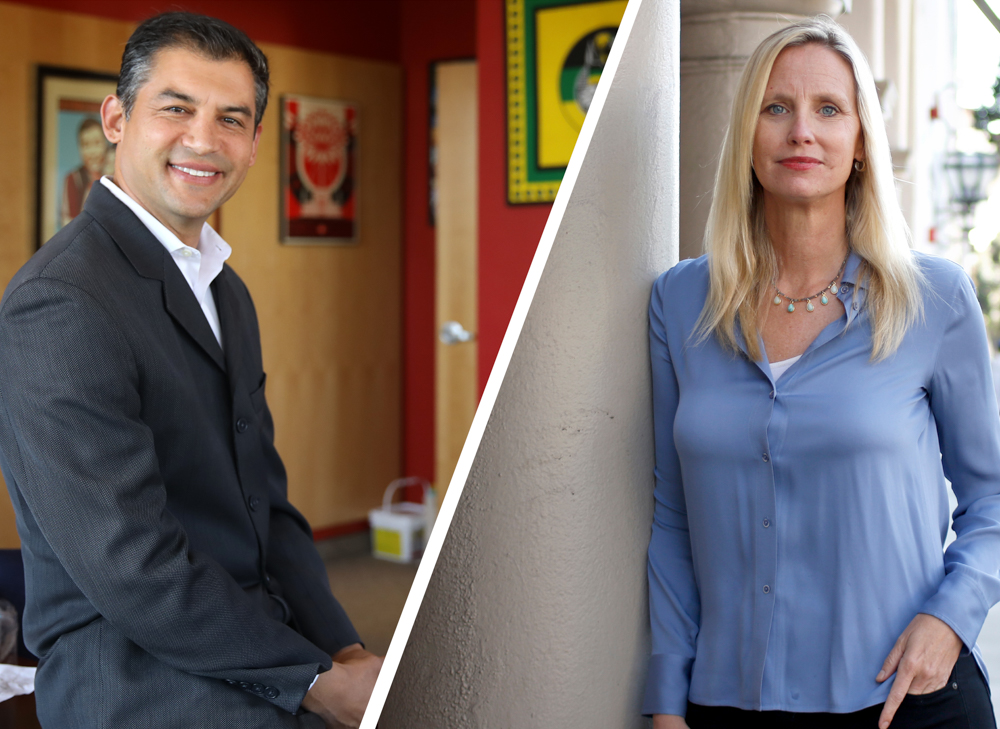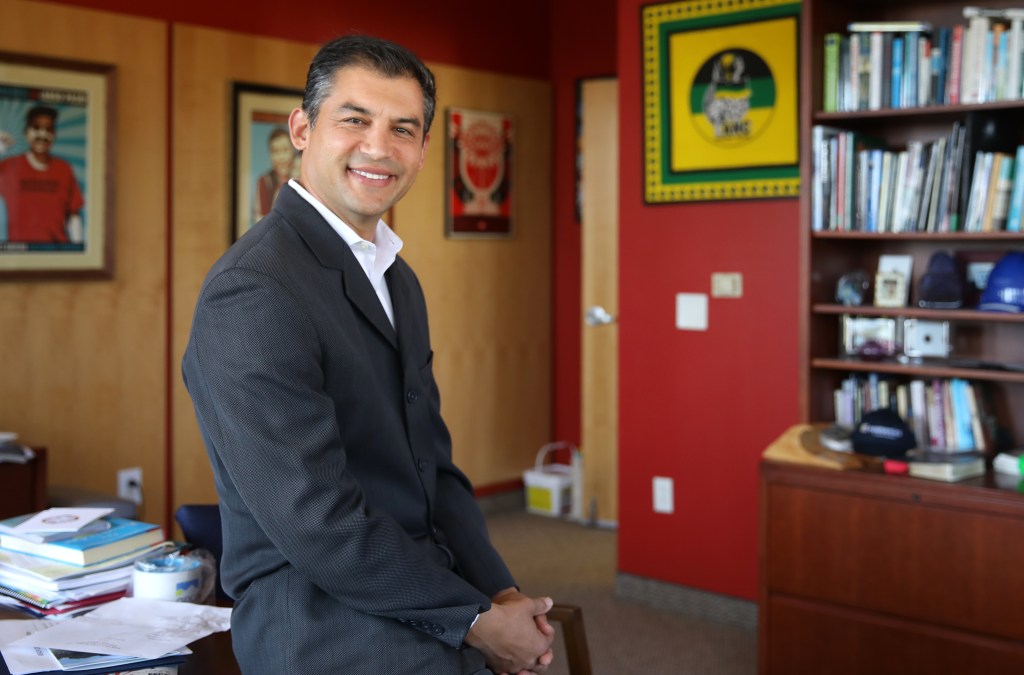A Look at the Lives of Das Williams and Laura Capps
‘Santa Barbara Independent’ Talks with 1st District County Supervisor Candidates and Their Past and Present Colleagues

As political tensions continue to skyrocket between incumbent Santa Barbara County Supervisor Das Williams and his challenger, school board president Laura Capps, voters only have a few more days before the March 3 election to choose their next supervisor for the 1st District, which encompasses Carpinteria, Cuyama, Montecito, Summerland, and most of Santa Barbara.
Both Democrats share similar values when it comes to the district’s top issues — the environment, homelessness, and housing — and only clash over Williams’s approval of cannabis cultivation sites in Carpinteria.
Capps, while she doesn’t disapprove of legal pot, feels Williams opened the cannabis floodgates too far and believes the $62,000 in campaign donations Williams received from cannabis interest groups influenced him while writing and enacting the law. Capps is calling for an ordinance on campaign finance reform to bar groups and individuals with projects before the board from contributing to campaigns.
Williams has consistently denounced Capps’s charges, writing off the $62,000 as “chump change.” He insists that the county goes to painstakingly rigid lengths to ensure the grows are in compliance with the law, and that they benefit the community by helping to defeat the black market and funnel extra property taxes into local schools.
With only one major policy issue dividing the candidates, personalities and track records will decide the outcome of this race. The Independent interviewed the candidates and their current and former colleagues to learn more about them.

Das Williams
Das Williams knew from a young age that he wanted to change the world — even if he didn’t know how yet.
Williams is an activist at heart. Aside from running for president in the 6th grade at San Antonio Elementary School in Ojai, he was not headed down a political career path until after childhood. Instead, Williams fought for what he believed in throughout his formative years.
“As a young brown man, I thought I could make the world better with force,” Williams said. “I was the kid that fought the kid bullying the gay kid. That’s just who I was.”
Williams grew up with his single mother, brother, and half-brother. Williams was the oldest and often took care of his siblings and young cousins. His mother was a teacher and his father, though not in the picture, was a well-known radio deejay for KTYD and KCSB and a surf historian.
The family moved numerous times — eight moves alone in his elementary years. Much of the time, he attended schools in Isla Vista. It wasn’t until he later moved to Paso Robles that he dropped out of high school at 16 because the other students did not share his passion for environmental activism. He moved back to Isla Vista and lived in his van during the warmer half of the year; he’d park it at Leadbetter Beach and take classes at SBCC. During his time at the college, he also became a born-again Christian.
“I received so much mentorship from poli-sci professors at SBCC,” Williams said. “They even helped me get scholarships to Berkeley. Dr. Eskandari’s classes were life-changing.”
Before completing UC Berkeley, though, Williams went on the detour of his life in 1994. With only one campaign under his belt — Supervisor Bill Wallace’s 1992 3rd District campaign — Williams flew to South Africa to work on Nelson Mandela’s African National Congress campaign.
“I just showed up asking for a job, and luckily I made it,” he said. “They probably were like, ‘Who is this teenager?’ but they took me on and paid me $20 a day.”
His biggest takeaway from his time working for Mandela was how fortunate Americans are for our government. He said he worked with people who were forced to “do terrible things to make political change,” and knowing he could make changes in the U.S. through democracy sealed the deal for his political career.
“I definitely think the way he grew up impacts Das’s work,” said Janice Rocco, who worked with Williams on Hannah-Beth Jackson’s State Assembly campaigns in the ’90s and later served as Hannah-Beth’s chief of staff. “He felt like an outsider as a kid, so he always makes himself available so nobody else will feel like he did.”
Rocco described Williams as being passionate and deeply knowledgeable about a wide range of policies — more so than the average. Despite his apparent knack for politics, Williams tried to escape after working on more than two dozen elections and twice finding himself backing the wrong candidate.
“Honestly, Das is the only elected official I’ve met who literally lives their values,” said Darcel Elliott, Williams’s current chief of staff, who began working for him 12 years ago. “He is crazy about reducing carbon emissions. He will only drive electric cars; he has to go the speed limit. Even his outfits have to be secondhand or American made.”
Because of his values, Williams tried to quietly leave politics by working as a support manager for an internet startup and as an advanced ESL and history teacher at 24. That only lasted a few years before his values pulled him back in — but this time to be a candidate himself.
Williams ran as the youngest candidate in a 10-person Santa Barbara City Council race in 2003 after the living wage campaign drew him in. He won and served on the council until 2010 before going on to serve in the State Assembly from 2010 to 2016. He was elected to his current supervisor position in 2016.
Williams, along with then-councilmember Helene Schneider, championed the Living Wage Ordinance in 2006 on the council. In 2014 in the Assembly, one of his greater accomplishments was co-authoring a bill that allows family members or police officers to petition the courts to temporarily remove a firearm from a person who is believed to be at risk of harming themselves or others.
“For most of my life, I’d be racked in pain if I wasn’t making a difference,” Williams said. “That’s why I keep doing this.”

Laura Capps
Laura Capps’s childhood in Santa Barbara could be described as nothing short of picturesque.
“I remember riding my bike all over town,” Capps said. “We basically lived at the beach. I have a strangely positive association with the smell of lighter fluid because my mom always kept some on the porch to remove the tar from our feet.”
Capps was younger than her two siblings, Todd and Lisa. Though a descendant of the Capps dynasty — both of her parents, Walter and Lois Capps, represented Santa Barbara in Congress — Laura wasn’t always set on politics. In fact, her parents didn’t discuss politics with her much at all until she was in her twenties. She knew from an early age, though, that she had a need to know how the world works and what drives it.
“I guess I was a huge nerd in junior high and high school,” Capps confessed, laughing. “I found out that if you write a letter to a senator, they send a photo back. So I’d write to all of them, and my wall was filled with Democratic senators.”
Her father, who died from a heart attack a year into his first congressional term, was a religion and ethics professor at UC Santa Barbara. He traveled to write religious history books, often taking the entire family with him. One such trip brought them to a monastery in Washington, D.C.
“I remember my dad telling me in D.C., ‘You could work here when you grow up one day,’” Capps said. “I remember just thinking, ‘Wow, maybe I will.’”
Capps initially wanted to be a reporter, interning at KEYT for John Palminteri, the Independent, and CNN before deciding journalism wasn’t her path. She took her father up on what he told her as a child and went to D.C. after college, where she got her political start as a White House aide to Senior Advisor George Stephanopoulos before becoming a speechwriter for President Bill Clinton. Her favorite job in D.C., she said, was working as communications director for Senator Ted Kennedy.
“Laura is a masterful communicator and has an excellent policy mind,” said Melissa Wagoner Olesen, who worked for Kennedy with Capps.
“She started out as a colleague, then she became a mentor, and now she’s my friend,” Wagoner Olesen said. “I learned so much from watching her. Her writing and speaking skills are eloquent, and she is graceful under pressure.”
Capps’s work on a bipartisan immigration reform measure initially known as the Secure America and Orderly Immigration Act — which involved Kennedy teaming up with Republican Senator John McCain — was some of her proudest work despite the bill failing. Two of the women from McCain’s team who worked on the bill are her best friends to this day.
After her job as Clinton’s speechwriter and before she worked for Kennedy, Capps, then 28, had to leave D.C. and drop her career in 1999 when she got the call that her sister Lisa had stage four cancer. At only 35, Lisa died within a year of her diagnosis and was survived by her husband and young sons. Capps stayed around another year to help her brother-in-law before heading back to D.C.
“The deaths of my dad and sister so close together in my twenties were pivotal points in life for me,” Capps said. “They both taught me a lot. Lisa taught me to talk to kids like they’re people.”
Children are a huge part of Capps’s life. She has an 8-year-old son, Oscar, and feels passionate about protecting the county’s youth. Capps currently serves as the president of the Santa Barbara Unified School District’s Board of Education after going unchallenged in 2016.
Capps spearheaded a local No Kid Hungry coalition that provides kids throughout Santa Barbara County with free, healthy breakfasts and lunches in the summer. She also served as president of Working Hero Action, a nonprofit working in four states to increase the Earned Income Tax Credit program, which helps lift families out of poverty.
She also has pushed for sustainability in Santa Barbara public schools, including adopting a climate-change resolution and hiring a district sustainability director. As of December 16, 2019, the school board voted to move off of fossil fuels and build microgrids to make schools safe havens during disasters. Her ability to push such initiatives goes back to her ability to communicate.
“Laura has this ability to put thoughts into really clear and concise sentences that can be summarized to the rest of the board,” said Kate Ford, a current school boardmember who works with Capps. “She doesn’t sugarcoat or BS the issues, either. If she doesn’t understand something, she’ll call and ask me or someone else before taking action on the board.”




You must be logged in to post a comment.